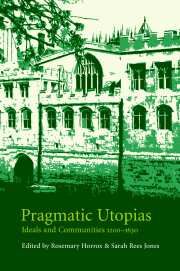Book contents
- Frontmatter
- Contents
- Preface
- List of abbreviations
- Richard Barrie Dobson: an appreciation
- 1 ‘If heaven be on this earth, it is in cloister or in school’: the monastic ideal in later medieval English literature
- 2 The ‘Chariot of Aminadab’ and the Yorkshire priory of Swine
- 3 Godliness and good learning: ideals and imagination in medieval university and college foundations
- 4 Hugh of Balsham, bishop of Ely 1256/7–1286
- 5 A cruel necessity? Christ's and St John's, two Cambridge refoundations
- 6 Coventry's ‘Lollard’ programme of 1492 and the making of Utopia
- 7 Thomas More's Utopia and medieval London
- 8 Social exclusivity or justice for all? Access to justice in fourteenth-century England
- 9 Idealising criminality: Robin Hood in the fifteenth century
- 10 Fat Christian and Old Peter: ideals and compromises among the medieval Waldensians
- 11 Imageless devotion: what kind of an ideal?
- 12 An English anchorite: the making, unmaking and remaking of Christine Carpenter
- 13 Victorian values in fifteenth-century England: the Ewelme almshouse statutes
- 14 Puritanism and the poor
- 15 Realising a utopian dream: the transformation of the clergy in the diocese of York, 1500–1630
- Bibliography of Barrie Dobson's published works
- Index
10 - Fat Christian and Old Peter: ideals and compromises among the medieval Waldensians
Published online by Cambridge University Press: 01 July 2009
- Frontmatter
- Contents
- Preface
- List of abbreviations
- Richard Barrie Dobson: an appreciation
- 1 ‘If heaven be on this earth, it is in cloister or in school’: the monastic ideal in later medieval English literature
- 2 The ‘Chariot of Aminadab’ and the Yorkshire priory of Swine
- 3 Godliness and good learning: ideals and imagination in medieval university and college foundations
- 4 Hugh of Balsham, bishop of Ely 1256/7–1286
- 5 A cruel necessity? Christ's and St John's, two Cambridge refoundations
- 6 Coventry's ‘Lollard’ programme of 1492 and the making of Utopia
- 7 Thomas More's Utopia and medieval London
- 8 Social exclusivity or justice for all? Access to justice in fourteenth-century England
- 9 Idealising criminality: Robin Hood in the fifteenth century
- 10 Fat Christian and Old Peter: ideals and compromises among the medieval Waldensians
- 11 Imageless devotion: what kind of an ideal?
- 12 An English anchorite: the making, unmaking and remaking of Christine Carpenter
- 13 Victorian values in fifteenth-century England: the Ewelme almshouse statutes
- 14 Puritanism and the poor
- 15 Realising a utopian dream: the transformation of the clergy in the diocese of York, 1500–1630
- Bibliography of Barrie Dobson's published works
- Index
Summary
In 1321 the inquisitor Bernard Gui was not satisfied with the answers he got from Raimonda about her contacts with the Waldensians. The record shows that he regarded her as not having confessed fully. However, Gui let her go, because she was breast-feeding her little baby. He got a lot further with Raimonda's sister Aignès, whose sharp observation and willingness to confess bequeathed to the inquisitorial record the name of one of the most interesting if enigmatic of all the Waldensian Brothers named by these witnesses, a certain old man called Peter: ‘quendam hominem senem … Petrum’. During his examination in 1316, another Waldensian follower, Géraut the son of Formont the Burgundian, told the inquisitor how on one occasion someone introduced him to a large and fat man called Christian: ‘ostendit sibi quendam hominem magnum et pinguem … et vocabatur Cristinus’. Fat Christian was another Waldensian Brother, but less in the shadows than Old Peter, for he was one of the leaders, a major, and one with whom many of the Waldensian followers questioned by Bernard Gui had had contacts.
Fat Christian and Old Peter–to whom I shall return–plunge us into the vivid detail provided by inquisition records, and they also introduce two contrasts between the earliest period of the Waldensian movement and later Waldensianism. One is a contrast in the evidence extant from different periods.
- Type
- Chapter
- Information
- Pragmatic UtopiasIdeals and Communities, 1200–1630, pp. 174 - 187Publisher: Cambridge University PressPrint publication year: 2001

